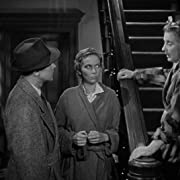While this column obviously teaches us all about people in the entertainment industry, especially when the people being covered are as obscure as Joy Harington, what can also be fun is discovering additional details about the world as it was in the past. Today, for example, we get to learn that, at the time Harington wrote, directed, and produced Jesus of Nazareth for the BBC, it was actually illegal in the UK for an actor to portray Jesus in a public performance. A young actor named Richard Palmer was, it seems, the first person to portray Jesus on British television, followed by Tom Fleming on the remaining seven episodes.
Unlike some of the people we’ve discussed, Joy Harington does have both an IMDb page and a Wikipedia page. However, the biographical information on both is a bit sketchy. It’s clear that she started as an actress; she was in twenty movies starting in 1943; all but two of her roles were uncredited. She was credited for all twenty-three of her television roles, but that doesn’t mean they aren’t also awfully obscure. At very least more people have probably seen Gaslight than The Thief, the Gang, and Jeremiah.
Because of how scanty her available biographical information is, it’s hard to say how she made the change from acting to behind-the-scenes work. She worked as a stage manager for the BBC in the early days of BBC television, apparently, and presumably that helped her make the switch. However, by 1949, she was writing, directing, and producing. It wouldn’t be surprising if there were fewer people interested in television in the UK in 1949, but it’s still surprising that they’d been willing to let a woman take on all three roles.
Granted, her work isn’t necessarily the most well known even in her behind-the-scenes work. She wrote a 1959 miniseries of Heidi featuring Ian Fleming-not-that-Ian Fleming? She managed to work on a version of Pollyanna with Elaine Stritch, and if no one has heard of a version of Pollyanna with Elaine Stritch as Aunt Polly, that’s a pretty obscure production. It’s unlikely that anything else she’d made would be better known, though it’s possible a lot of this is better known in the UK. Maybe they rerun one of her multiple Stevenson productions all the time.
Still, if we regularly cover people doing serious behind-the-scenes work, it’s a good job to cover even the obscure ones. It’s likely that Harington’s career made it possible for other people to follow—both women for whom the glass ceiling had been broken and people who were able to be writer/director/producers because Harington had shown it was possible. And if people don’t necessarily remember her as Bertha in My Name Is Julia Ross or the nurse in National Velvet, that’s not surprising, but it still means that it’s worth talking about the other things she did.
If you like learning information like this, consider supporting my Patreon or Ko-fi!

